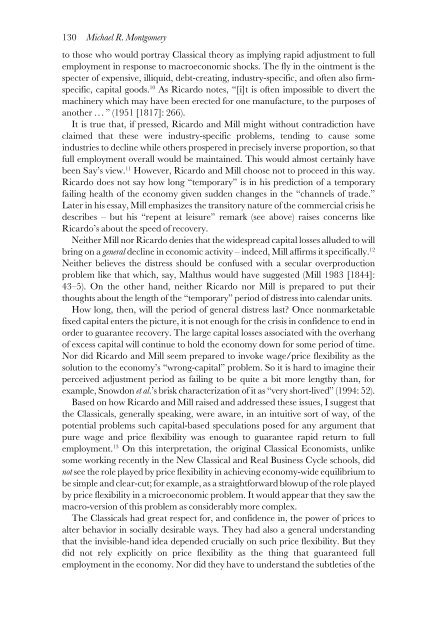Money and Markets: Essays in Honor of Leland B. Yeager
Money and Markets: Essays in Honor of Leland B. Yeager
Money and Markets: Essays in Honor of Leland B. Yeager
Create successful ePaper yourself
Turn your PDF publications into a flip-book with our unique Google optimized e-Paper software.
130 Michael R. Montgomeryto those who would portray Classical theory as imply<strong>in</strong>g rapid adjustment to fullemployment <strong>in</strong> response to macroeconomic shocks. The fly <strong>in</strong> the o<strong>in</strong>tment is thespecter <strong>of</strong> expensive, illiquid, debt-creat<strong>in</strong>g, <strong>in</strong>dustry-specific, <strong>and</strong> <strong>of</strong>ten also firmspecific,capital goods. 10 As Ricardo notes, “[i]t is <strong>of</strong>ten impossible to divert themach<strong>in</strong>ery which may have been erected for one manufacture, to the purposes <strong>of</strong>another . . . ” (1951 [1817]: 266).It is true that, if pressed, Ricardo <strong>and</strong> Mill might without contradiction haveclaimed that these were <strong>in</strong>dustry-specific problems, tend<strong>in</strong>g to cause some<strong>in</strong>dustries to decl<strong>in</strong>e while others prospered <strong>in</strong> precisely <strong>in</strong>verse proportion, so thatfull employment overall would be ma<strong>in</strong>ta<strong>in</strong>ed. This would almost certa<strong>in</strong>ly havebeen Say’s view. 11 However, Ricardo <strong>and</strong> Mill choose not to proceed <strong>in</strong> this way.Ricardo does not say how long “temporary” is <strong>in</strong> his prediction <strong>of</strong> a temporaryfail<strong>in</strong>g health <strong>of</strong> the economy given sudden changes <strong>in</strong> the “channels <strong>of</strong> trade.”Later <strong>in</strong> his essay, Mill emphasizes the transitory nature <strong>of</strong> the commercial crisis hedescribes – but his “repent at leisure” remark (see above) raises concerns likeRicardo’s about the speed <strong>of</strong> recovery.Neither Mill nor Ricardo denies that the widespread capital losses alluded to willbr<strong>in</strong>g on a general decl<strong>in</strong>e <strong>in</strong> economic activity – <strong>in</strong>deed, Mill affirms it specifically. 12Neither believes the distress should be confused with a secular overproductionproblem like that which, say, Malthus would have suggested (Mill 1983 [1844]:43–5). On the other h<strong>and</strong>, neither Ricardo nor Mill is prepared to put theirthoughts about the length <strong>of</strong> the “temporary” period <strong>of</strong> distress <strong>in</strong>to calendar units.How long, then, will the period <strong>of</strong> general distress last? Once nonmarketablefixed capital enters the picture, it is not enough for the crisis <strong>in</strong> confidence to end <strong>in</strong>order to guarantee recovery. The large capital losses associated with the overhang<strong>of</strong> excess capital will cont<strong>in</strong>ue to hold the economy down for some period <strong>of</strong> time.Nor did Ricardo <strong>and</strong> Mill seem prepared to <strong>in</strong>voke wage/price flexibility as thesolution to the economy’s “wrong-capital” problem. So it is hard to imag<strong>in</strong>e theirperceived adjustment period as fail<strong>in</strong>g to be quite a bit more lengthy than, forexample, Snowdon et al.’s brisk characterization <strong>of</strong> it as “very short-lived” (1994: 52).Based on how Ricardo <strong>and</strong> Mill raised <strong>and</strong> addressed these issues, I suggest thatthe Classicals, generally speak<strong>in</strong>g, were aware, <strong>in</strong> an <strong>in</strong>tuitive sort <strong>of</strong> way, <strong>of</strong> thepotential problems such capital-based speculations posed for any argument thatpure wage <strong>and</strong> price flexibility was enough to guarantee rapid return to fullemployment. 13 On this <strong>in</strong>terpretation, the orig<strong>in</strong>al Classical Economists, unlikesome work<strong>in</strong>g recently <strong>in</strong> the New Classical <strong>and</strong> Real Bus<strong>in</strong>ess Cycle schools, didnot see the role played by price flexibility <strong>in</strong> achiev<strong>in</strong>g economy-wide equilibrium tobe simple <strong>and</strong> clear-cut; for example, as a straightforward blowup <strong>of</strong> the role playedby price flexibility <strong>in</strong> a microeconomic problem. It would appear that they saw themacro-version <strong>of</strong> this problem as considerably more complex.The Classicals had great respect for, <strong>and</strong> confidence <strong>in</strong>, the power <strong>of</strong> prices toalter behavior <strong>in</strong> socially desirable ways. They had also a general underst<strong>and</strong><strong>in</strong>gthat the <strong>in</strong>visible-h<strong>and</strong> idea depended crucially on such price flexibility. But theydid not rely explicitly on price flexibility as the th<strong>in</strong>g that guaranteed fullemployment <strong>in</strong> the economy. Nor did they have to underst<strong>and</strong> the subtleties <strong>of</strong> the
















